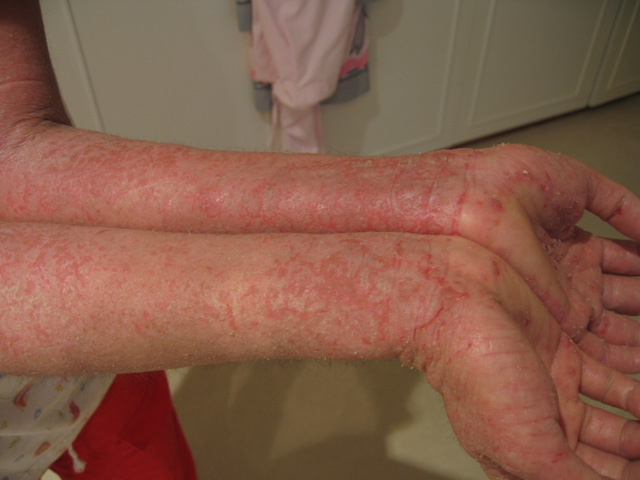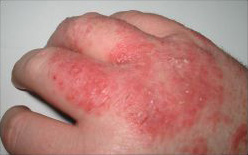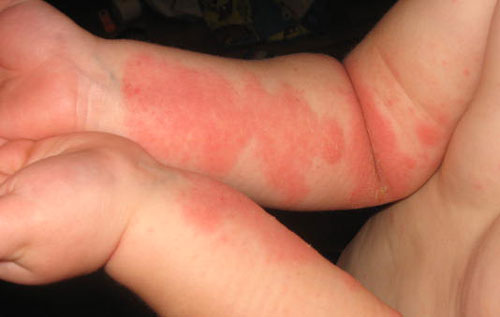Eczema is a broad term a for wide variety of skin conditions, but its true synonym is atopic dermatitis meaning that it is found on the top layers of inflamed skin. It can often be confused for, or misdiagnosed as, psoriasis and urticaria because they all share similar symptoms.

Symptoms of Eczema
Symptoms for eczema include redness due to irritation, swelling (also called edema), ashy texture of the skin as a result of dryness, crusting, flaking, and other symptoms that include itching, blistering, oozing, and bleeding.
As the skin itches, people suffering from atopic dermatitis will be prone to scratching or rubbing, but as this is done, the symptoms flare up further, causing more pain and discomfort.
Eczema is very common in infants, but can affect people of all ages. Lighter skinned people will find that their skin will redden as the symptoms become more severe and darker skinned people will find that their skin color will change as well. Those with dry skin due to eczema will find that in the summer months they will not tan evenly.
Eczema? Get Remedies Fast!
Dry areas will stay as they were prior to receiving sunlight, which will often be most prevalent in joints where the skin touches itself, such as behind the elbows or knees. Other areas prone to be affected by eczema are around the chest, eyes, and ears.
Causes of Eczema
There is no definitive answer as to what causes eczema, but several correlations have been drawn in families where allergies and asthma are present. Physiologically, the body’s immune system may be overacting to one of many triggers causing the skin to become irritated more easily.
Some patients find that it is merely a matter of skin sensitivity. They may find their skin flaring up as a result of touching materials that it is sensitive to, such as wool. Others may find reactions in certain products like soaps and detergents leading them to have to purchase more expensive, skin-friendly brands that include Dreft and SA8.
Weather-Related Causes
Hot and cold weather and water can also cause breakouts and irritation. Following a very hot shower a person with eczema will find that not only is the skin more sensitive, but that the coarseness of a towel further irritates the area, resulting in more cracking and bleeding.
To solve this problem for those who find themselves especially troubled by the winter weather the best course of action is to engage in tepid (not too hot, but not cold either) showers, and to dry themselves afterward by blotting the towel on the skin rather than wiping or rubbing it as so many are used to.
Confusion with Other Skin Conditions
One thing many should never confuse eczema with is contagious skin conditions, such as ring worm. While eczema can look unattractive and even a little scary, it is not contagious.
While it is not known what causes eczema exactly, Dr. Ross Zeltzer notes in his article for Baptist Health Systems about which specific factors increase one’s risk of suffering from it. As mentioned earlier, one may simply contract atopic dermatitis as a result of a mother or father having it. It is unknown as to why, but parents who suffer from allergic disorders like hay fever, asthma, and eczema have children who offer suffer from it as well.
You Environment
Another factor deals with the environment one lives in. While some people are more comfortable in a dry environment others thrive in a tropical one. Many such cases were found of Royal Marines who deployed to the Middle East in 2005. Those who had suffered from eczema the previous year carried no symptoms while deployed overseas. However, when they returned home the symptoms returned with them.
Other environmental irritants can include soaps, detergents, and clothing that is harsh on the skin as well as particles from materials. Those who work in wood shops may find that sawdust is unkind to them just as those who work in metal shops can find the same of steel, aluminum, and various alloys. People who work around harsh chemicals may find that the fumes cause their skin to feel irritated even if they are more common chemicals like chlorine or those added to lotions and perfumes.
Medical Conditions, Food Reactions, & Age
Medical conditions add to one’s risk factors for being affected as well. People who are allergic to pollen or animals may find the reaction come by way of their skin. Dust mites, mold, and certain kinds of food can cause irritation as well.
Food reactions that cause skin breakouts are not always eczema, though. People who are allergic to shellfish may find that their skin will break out in hives. If not treated properly, the swelling can close up their throat and kill them. While eczema is very serious if untreated, it will not be fatal.
And a last factor includes one’s age. Most people who suffer from eczema begin doing so before they are toddlers with the vast majority of the rest developing it before they are five years old. This being said, a person may still find themselves with dry, flaky, crusting skin behind their elbows and knees, and even on the tops of their heads and the backs of their necks when they are middle aged or retired.
Preventing & Relieving Eczema Symptoms

Preventing eczema first comes with knowing what causes it. Having already covered this area, the next steps are to figure out what steps people can take as a means of not having to deal with it between behavioral and pharmaceutical therapy.
For those who prefer a quick fix one actually can be found. For eczema, it is in topical medicines that are usually steroid creams, such as Cortisone.
For those who only have to cover a small area this method of treatment will work well. But for those who have chronic flare-ups engulfing large areas, or the majority of their skin, Cortisone creams carry risk factors as well.
Side Effects
Potential side-effects of using steroid medications include Glaucoma, which is why it should never be applied to the face, especially near the eyes, hypopigmentation, which is when the skin whitens, and another possible side effect is the skin increasing in its severity of atopic dermatitis.
Cortisone creams can work quite effectively, but in some cases they will make matters worse. Along with never using it on one’s face, it should not be applied to the groin, and a doctor should be consulted if it does not work within three weeks.
For those who do not want to treat their dermatitis with a pharmaceutical method, the next alternative is to engage in behaviors that are in support of the skin.
Other Prevention Techniques
The first means of behavioral prevention is to avoid things that cause eczema. Mild hand soaps like Oil of Olay, Cetaphil, and Dove are highly recommended because they are gentle. After washing, hands should be dried completely. As strange as it may sound to some, water can actually be a causal factor in drying out the skin.
The same goes for showering. These same brands come in body washes as well, but they will not be of much help for those who insist on taking very hot showers. The heat, when extreme, will be counter-productive in the process of creating any kind of relief. Redness and inflammation will intensify the affected areas. Showers can last up to twenty minutes. Afterward, be sure to pat the skin dry rather than rubbing. This cannot be emphasized enough because so much unnecessary and easily avoidable skin damage can be done in the moments after a shower or bath is taken.
After showering, it is time to apply a moisturizer. For those who have something prescribed by a medical professional, use that and to the specific instructions of the provider. Otherwise, a moisturizer with no added perfumes is best. Again, brands known for being gentle are preferred. Some say that it is best to apply moisturizer while the skin is wet after a shower and others disagree. For this, it is really up to what works best for the person applying it. But applying moisturizer is a key to finding relief over eczema.
Using Moisturizers
Moisturizers should be applied several times a day. For those who have irritated skin that is not eczema, moisturizer can actually be part of the problem, but for those with it, it is vital. Applying moisturizer several times a day works in two ways. It creates a thin barrier between the skin and the outside environment that is damaging it, much like lip balm does. Then, the moisturizing barrier will allow the body to soothe itself with its own means before it evaporates from the skin, which will then result in the need to reapply.
For those who work in a wet environment, such as dishwashers and fishermen, it is best to where gloves while working. However, it is also important to note that excessive sweat causes eczema as well, so for those who wear waterproof hand protection, another method necessary to prevention may be to wear a thin pair of cotton gloves to soak up the sweat that builds up beneath.
Avoid Scratching and Touching Affected Areas

Adding to this, environments that are extreme can cause a person to scratch or rub certain areas repeatedly.
As extra sensitive areas like the eyes are repeatedly rubbed the result can be a kind of chronic itch in need of being addressed almost constantly.
Just as one must engage in self-control over larger parts of his or her environment, so must he or she take control over the need to create relief in this manner.
Not only will it create a more severe edema, flaking, or bleeding, but it may also cause infection as dirt can collect on the hands and under the fingernails that will then be transferred into the the breaking surface of the epidermis.
Clothing Considerations
Clothing should be monitored carefully. Cotton and clothes made of a cotton blend are often more gentle than those made of wool or synthetic materials. This is especially true of those who sweat a lot.
Athletes have been getting in on this trend by taking advantage of new workout technology that wicks away sweat rather than collects it. While sweat is an efficient means of helping the body cool, it is also a productive way to create chaffing. For those without eczema, this can be irritating if not painful. For those who do have it, the pain can become quite severe.
The last area where prevention can be managed is in stress. While there will always be stress in a person’s life, there are techniques that can cause a person to settle it to a lessening degree. Between breathing exercises, physical exertion, talk therapy, and laughing, people who suffer from atopic dermatitis can find relief by forgetting about it temporarily.
Of course, one would not want to forget about it for too long. After the symptoms of eczema have gone away it is very important to be proactive in one’s self treatment. Regular moisturizing should not stop if it can be helped because managing eczema when it is not flaring up is much easier than when it is, making it true that prevention sometimes can be the best cure.
Diagnosing Eczema
For those who are unsure as to whether or not they have eczema, it can be difficult since conditions like psoriasis appear to be similar in nature. Sometimes a dermatologist can tell simply by observing common areas of sensitivity like the creases in one’s skin, the chest, and the face. If these areas are red, swollen, itchy, ashy, flaking, or cracked, it may be concluded that it is eczema.
To complement this, a detailed history of one’s record should be made. Those who have a personal or family history of eczema, or the common allergies that correlate with it, strengthen the case for a proper diagnosis.
Preparing for a Doctor’s Visit
Patients should do their best to provide the most accurate answers in relation to when the skin irritation first appeared. This will help skin specialists in the healing and prevention process. If it is believed to be allergen-related, a skin patch test may be ordered. This test consists of applying a small area of tape with the suspected irritant on it to be applied to the skin for a day or two.
At the same time, a piece of tape without the irritant is also applied. If the area with the irritant is red and inflamed then the culprit has been found, but only if the skin with no applied irritant is not. This part of the test is very important because it could very well be that the skin was irritated simply from having tape on it for an extended period of time.
In rare cases, one of two other tests may be ordered. A skin lesion biopsy can be taken where a small area is excised for testing, or a Radioallergosorbent Test (RAST) will be performed, which involves taking a sample of blood and mixing it with potential irritants separately. While both tests are very effective, they are often unnecessary with proper behavioral care through moisturizing and sometimes applying prescribed medicated creams.

No Comments